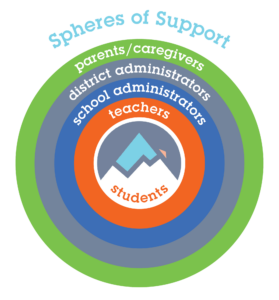Share this article.
An article for school administrators and aspiring administrators
Dear educators, this article is part of a series of articles articulating the actions of instructional leadership that when implemented, will help you build your dream school. In this fourth and final installment of the series, we will show you how to empower the people that have the greatest impact on your students—your teachers.
What Matters Most
An effective principal’s primary focus is to make sure that each and every student receives the highest level of instruction every day. So, what matters most? Is it the structures of school such as class size, retention, student placement, or summer school? Does it matter who the students are? Are educational programs the magic bullet?
John Hattie calls all of these things, “The Politics of Distraction—the kinds of things we talk about in our business so often, which means we avoid addressing what really matters in schools” — the expertise of the teachers.
It’s no surprise that the most significant effect on student achievement is caused by the classroom teacher. Time and again, research bears out that effective teachers are the most important factor contributing to student achievement. As RAND Education reminded us,
“…research suggests that among school-related factors, teachers matter most. When it comes to student performance on reading and math tests, a teacher is estimated to have two to three times the impact of any other school factor, including services, facilities, and even leadership.”
Therefore, if a school’s instructional leaders are to ensure students’ academic success, they must focus on the learning of the teachers.
The Spheres of Support
Consider the Spheres of Support as you think about your school and district. If a school or district is truly student-centered, then each educational stakeholder in the system has very specific responsibilities. These responsibilities identify the vital, and unique, roles of teachers, school-site administrators, district-level administrators, and parents and caregivers.
The vital role of teachers is to consistently and intentionally support students to own their learning. The vital role of school-site administrators is to utilize the actions of instructional leadership to consistently and intentionally support teachers to own their role in student learning. The vital role of district-level administrators is to utilize the actions of instructional leadership to consistently and intentionally support schools-site administrators to own their role of leading initiatives that elevate student achievement. The vital role of parents and caregivers is to consistently and intentionally support their child to own their role in learning at home, thereby reinforcing the support students are receiving at school.
As an administrator, you will be introducing new initiatives, as needed, to elevate student achievement. How a teacher views an initiative is crucial—whether it be the development of a course scope and sequence, the implementation of a comprehension strategy for informational text, the use of newly-adopted resources, or the collaboration inherent in a data protocol. The teacher’s motivation—their understanding, their practicing, their reflecting—is key to the successful implementation of any initiative.
In other words, your teachers are key to the implementation of any initiative that will substantively increase achievement, and your role to provide the support that gets them to own their role in the learning and implementation of this initiative. You will achieve this by ensuring that teachers have the authority, the capacity, and the responsibility to own their learning and to determine the most effective way for them, individually, to support the implementation of the initiative. You will do this by supporting them to cultivate an ownership mindset.
The Authority, the Capacity, and the Responsibility of Teachers
How do you support your teachers in cultivating an ownership mindset? By delegating the authority, the capacity, and the responsibility to them.

© Shutterstock/Jamila Aliyeva
Successful teachers will have the authority to make decisions regarding the day-to-day planning of their instruction. This doesn’t mean that they are free to decide what they want to teach solely based on their interests. This would not prepare their students to learn skills and content needed to be college and career ready. Instead, this means that they have the authority to determine what they, as the teacher, need to do to support mastery of the skill by their students—for example, initial instruction, frequency and types of practice, specific opportunities for students to authentically apply their learning, and built-in opportunities for their students to transfer their learning into new situations. It is the role of the principal to ensure that teachers have the authority to make decisions about how their students will learn.
To do this, teachers must have the capacity to make the most effective and efficient decisions regarding student learning. Teachers have the capacity when they have the knowledge and skills to implement the initiative at the highest level. Teachers have the capacity when they are able to challenge themselves and self-reflect on their growth. Capacity is built by supplying teachers with the skills needed to succeed, sharing why they need them, and explaining how they will use them in current and future situations. Once teachers have the authority to make decisions about how they will teach, it is the role of the principal to ensure they have the capacity to analyze and reflect on their own learning.
Finally, teachers must have the responsibility to be held accountable for their classroom achievements. Teachers must understand their role in their students’ learning and take responsibility for their successes as well as their mistakes. But they can’t be held responsible if they have no understanding of what they are implementing, how they will be supported, and how they will demonstrate their learning. Principals cannot ask their teachers to take responsibility if they are not given the authority and the capacity to do so.
How to Begin
So, how do you build authority, capacity, and responsibility within your staff? You become the model for the thinking behind ownership. You explicitly teach the skill of ownership. And, most importantly, you are willing to delegate the authority, capacity, and responsibility to your teachers.
Continue the Learning
Check out these articles and resources to continue your learning about this topic…
The Learning Brief
In this article you learned…
- That more than structures, policies, and programs, that the most significant effect on student achievement is caused by the classroom teacher.
- The vital roles of teachers, school-site administrators, district-level administrators, and parents and caregivers in elevating student achievement.
- How to support your teachers in cultivating an ownership mindset.
Can you imagine building an environment full of motivated, engaged, and eager students who own their learning?
We can.


